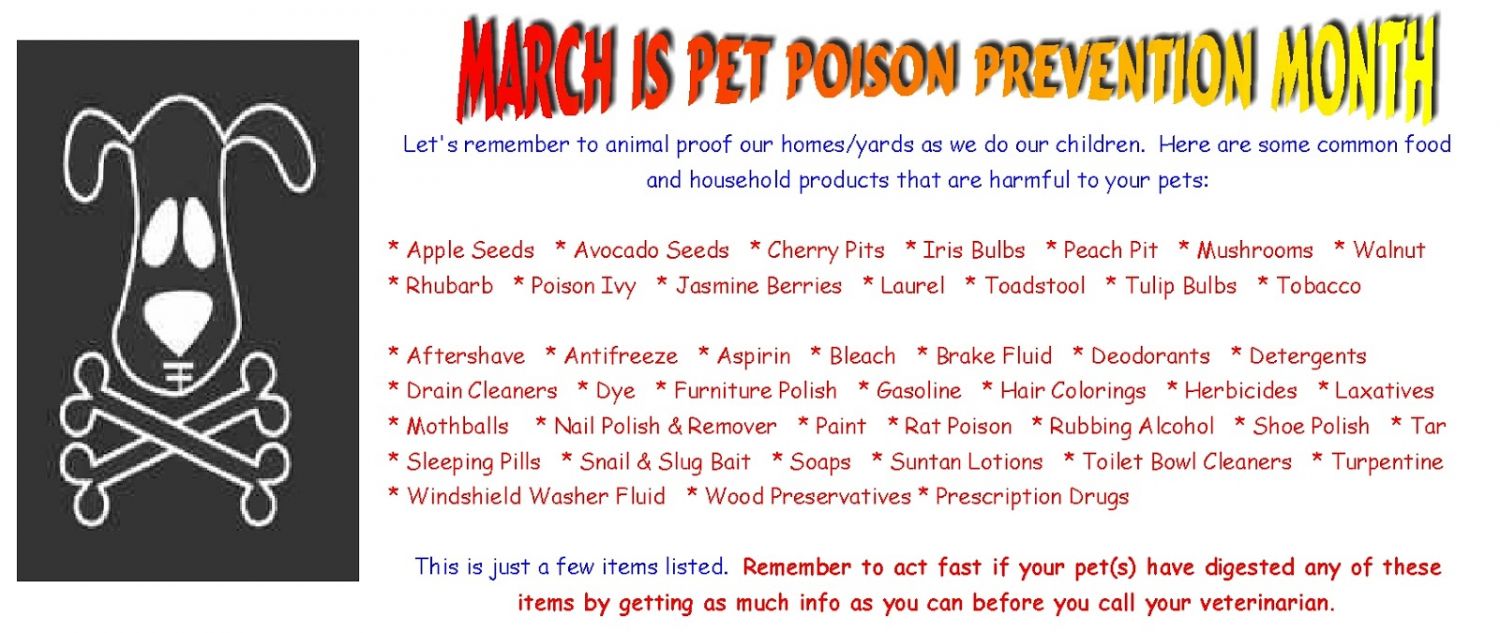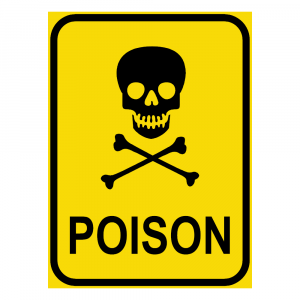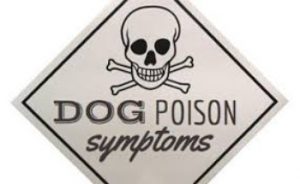
March is Pet Poison Awareness Month. A good number it always keep on hand is the 24/7 Pet Poison Control Center Help Line: 1-855-764-7661. There is a fee for its use, so have your credit card ready when you call.

TOP 10 PET POISONS
 Based on the Pet Poison Helpline call volume and extensive database, here are the top 10 most common toxins that Pet Poison Helpline gets called about. Now keep in mind, some of these listed are very toxic, while some are minimally toxic. When in doubt, call us, or Pet Poison Helpline to make sure there won’t be a problem. Take special care to keep these toxins out of your pet’s reach and pet-proof your house!
Based on the Pet Poison Helpline call volume and extensive database, here are the top 10 most common toxins that Pet Poison Helpline gets called about. Now keep in mind, some of these listed are very toxic, while some are minimally toxic. When in doubt, call us, or Pet Poison Helpline to make sure there won’t be a problem. Take special care to keep these toxins out of your pet’s reach and pet-proof your house!
Dog Poisons:
- Chocolate
- Mouse and Rat Poisons (rodenticides)
- Anti-inflammatory medications
- Xylitol (sugar-free gum & more)
- Grapes & Raisins
- Antidepressant Medications
- Acetaminophen (e.g., Tylenol)
- Vitamin D Overdose
- Stimulant Medications (e.g., for ADD/ADHD)
- Fertilizers
- Cat Poisons:
- Lilies (Lilium species)
- Spot-on flea/tick medication for dogs
- Household Cleaners
- Antidepressant Medications
- Essential Oils
- Anti-inflammatory Medications
- Mouse & Rat Poisons (rodenticides)
- Stimulant Medications (e.g., for ADD/ADHD)
- Onions & Garlic
- Vitamin D Overdose
Share
Cat Poisons:
Lilies (Lilium species)
- Spot-on flea/tick medication for dogs
- Household Cleaners
- Antidepressant Medications
- Essential Oils
- Anti-inflammatory Medications
- Mouse & Rat Poisons (rodenticides)
- Stimulant Medications (e.g., for ADD/ADHD)
- Onions & Garlic
- Vitamin D Overdose
Know The Signs of Poisoning in Dogs and Cats

Signs of poisoning in dogs and cats can range tremendously based on the underlying poison. If you think your dog or cat has been poisoned, call us or the Pet Poison Helpline at 855-764-7661 immediately for assistance! When it comes to poisoning, the sooner you treat your dog or cat, the better the outcome.
While this list is not exhaustive or complete, some common signs of poisoning generally include:
Gastrointestinal signs
- Vomiting
- Diarrhea
- Drooling/hypersalivating
- Inappetance
- Nausea
Internal bleeding
- Coughing of blood
- Vomiting blood
- Pale gums
- A racing heart rate
- Weakness or lethargy
- Collapse
Kidney failure
- Halitosis (“uremic” breath)
- Inappetance
- Vomiting
- Diarrhea
- Excessive thirst or urination
- Absence or decreased urination
Liver failure
- Jaundice/icterus/yellow discoloration to the gums
- Weakness or collapse secondary to a low blood sugar
- Dull mentation, acting abnormally
- Vomiting
- Diarrhea
- Black-tarry stool (melena)
